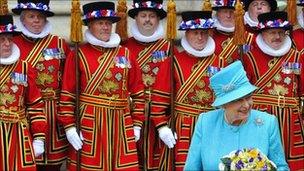The Queen hands out Maundy money
- Published
The Queen distributed Maundy money to 85 men, and 85 women.
The Queen has celebrated her 85th birthday by handing out Maundy money in a traditional royal service at Westminster Abbey.
The monarch handed out specially minted coins to deserving recipients in a ceremony dating from the Middle Ages.
Among the 170 people - 85 men and 85 women - who received Maundy money this year were 40 from the Isle of Man.
Buckingham Palace said it was the first time the Queen's birthday had fallen on Maundy Thursday.
'Big adventure'
Each year the Queen chooses a different church to distribute the coins, known as Maundy money.
This year the venue was the abbey, which will also host the wedding of the Queen's grandson, Prince William, to Kate Middleton, on 29 April.
When the Queen, accompanied by the Duke of Edinburgh, arrived at the abbey's Great West Door, a trumpet fanfare was sounded.
The Queen and the duke were presented with the traditional nosegays of sweet herbs as they walked inside.
The royal couple and a series of colourful processions featuring musicians, senior clergy and delegations from the two dioceses involved then made their way through the nave into the heart of the church.
The groups were joined by members of the Royal Almonry - an office within the Royal Household that enables the monarch to distribute alms.
The service began with the 19th Century hymn Praise To The Holiest In The Height and was followed by a series of prayers.

The Queen celebrated her 85th birthday by giving Maundy Money
The Bishop of Sodor and Man, the Right Reverend Robert Paterson - whose district is one of the ancient Celtic dioceses of the British Isles - gave the first lesson, reading the passage from the book of John which describes Jesus washing the feet of his followers.
Afterwards the Queen handed out red and white purses - bourne on trays held by a Yeoman of the Guard - in the centuries-old tradition.
The red purse contained a £5 coin commemorating the Duke of Edinburgh's 90th birthday in June, and a 50p coin marking the 2012 London Olympic Games.
The white purse held uniquely minted Maundy money made up of silver one, two, three and four penny pieces, the sum of which added up to the Queen's age.
One of this year's recipients was Dorothy Boyde, 75, who had never left the Isle of Man before.
She told the BBC: "I wouldn't go for anything else. It's a big adventure."
Two birthdays
Another recipient, Henry Hely-Hutchinson, 85, from Chelsea - who was nominated for his voluntary work as a guide at the abbey - said he was "proud" to be part of the ancient ceremony.
The Duke read the second lesson from the book of Matthew about how "the son of man" will pass judgment on the good and bad - before the Queen presented the remaining money.
Usually the recipients of the symbolic alms - one for each year of the monarch's life - are drawn from the same diocese as the cathedral the Queen visits.
The Bishop of Sodor and Man, the Right Reverend Robert Paterson, suggested to the Queen several months ago that she visit Douglas.
However Buckingham Palace decided it was too difficult for the Queen to visit the island, but said Manx residents could be nominated for the honour this year.
Also nominated were people from the Anglican Diocese of Europe, which is based in Gibraltar.
The Maundy Service was seen as a chance to iron out any technical issues ahead of next week's royal wedding - which will also be broadcast live from Westminster Abbey.
Formal consent
The Queen has two birthdays - the actual one and the official one in June, which is celebrated with the Trooping the Colour parade.
On Thursday Union flags are being flown above government buildings from 0800 BST until sunset, and the King's Troop Royal Horse Artillery gave a 41-gun salute in Hyde Park.
The Honourable Artillery Company also fired a 62-gun tribute from Gun Wharf at the Tower of London.
Meanwhile, the Queen has given her formal consent to the marriage of Prince William and Kate Middleton under the historic Great Seal of the Realm.
She signed a notice of approval - in transcribed calligraphy - giving consent to the union, without which the marriage would be invalid.
William had to ask his grandmother's consent under the Royal Marriages Act 1772, which states that descendants of George II must have the monarch's agreement to make the marriage lawful.
The Archbishop of Canterbury has also wished royal couple the "courage and clarity" he says they will need to get married in the public eye.
- Published21 April 2011
- Published21 April 2011